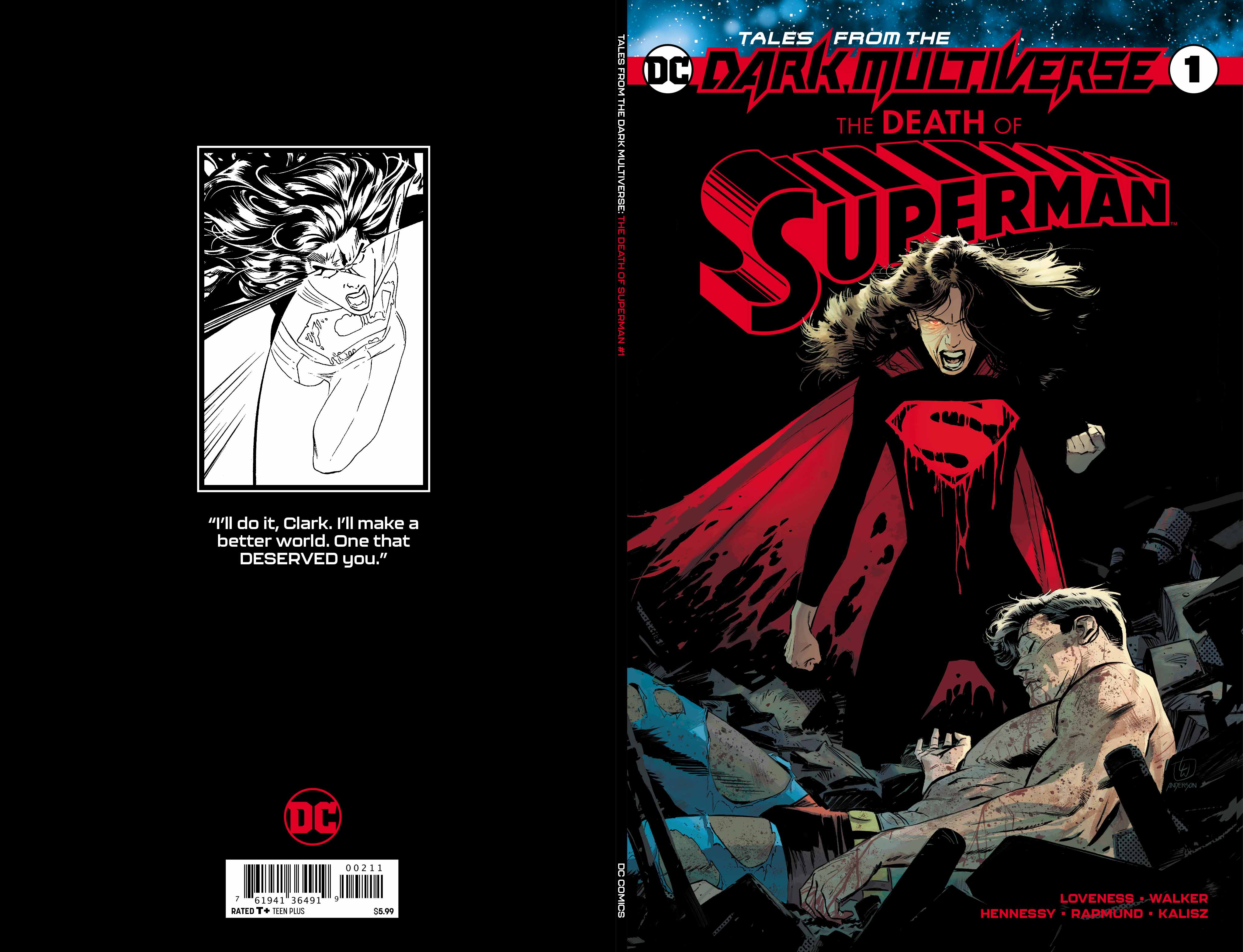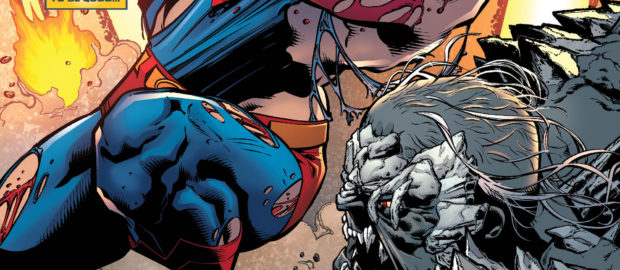The Tales from the Dark Multiverse are imagining alternate versions of classic DC Comics stories, and in The Death of Superman #1 things turn out differently when Lois Lane takes over after Superman’s untimely death.
Jeff Loveness (script) and Brad Walker (pencils) present the story of Lois Lane, the Eradicator. Superman is dead and the powers of Krypton are transferred to her, but when she realizes how much power she can wield it changes everything about her. Her rage and frustration come to the fore as she vows to make a world that deserves someone like Superman.
Unfortunately, taking on that much power leads to complications, and the responsibility is more than Lois could ever have imagined. As she forges on ahead, without Superman or Clark Kent, Lois creates a new identity for herself. But where people once looked to Superman for hope, people have a very different opinion of Lois Lane.
In our interview, Loveness and Walker break down the early planning stages of the story and whether or not there could ever have been a different ending for this twist on a classic Superman story.
(Sarabeth Pollock) Fans know that the Death of Superman story is a traditionally tragic story by itself, and this story asks you to take it and make it even more tragic. Can you talk about what the early stages of planning were like as you came up with a plan for the story?
Jeff Loveness: Yeah, I wanted to do a close character study on Lois Lane. I love her as a character. To me, she’s the bravest, most idealistic person in the DC Universe. I wanted to try a story that would show just how tragic it would be for someone like her to lose faith. The Death of Superman seemed like the perfect narrative vessel for that. I sent DC a wild pitch, which I don’t think they were expecting. And to their credit, they caught my passion for the character and this story and were onboard.
Brad Walker: From an artistic perspective, I wanted to make sure the story felt like it could’ve really been a part of that era and that original storyline. I reread the original and compiled a ton of reference to try to accurately depict the early 90s and keep all the little details from the interlocking series of the time consistent. Having freshly read the whole Death, Funeral, Reign, and Return storyline, this felt like something we could’ve stretched over a year or two, because I had that pacing in my mind. But just drawing a 48-page one shot is a big undertaking, so I wanted to cram in everything I could.

Tales from the Dark Multiverse: Death of Superman. Photo: DC Comics
This version of Lois reminds me of what we’d all be like if we suddenly found ourselves with superpowers. She tries to extinguish the root causes of evil, which doesn’t always work the way we think it would. She thinks Superman was holding back for some reason, but she’s actually missing the bigger picture about power and responsibility. Can you talk about what she gets right, and what she’s missing? And can you talk about what this story says about what Superman has/had to live with on a daily basis?
Loveness: I think Lois gets right the fact that Clark was operating from a very reactionary messianic place. Save. Don’t change. He stops bank robbers. He doesn’t end poverty or destroy weapon manufacturers. He stops disasters. He doesn’t stop the corporate polluters wreaking climate havoc. He doesn’t oust the corrupt politicians. I think Lois has an excellent point that Clark wasn’t thinking big enough.
By the end of the story, I think she realizes that once you open yourself to bloodshed, like Macbeth, it’s a slippery slope and you soon lose the high ground. Yes, there is something naive about Superman, but that naivety is grounded in love. There’s something unmistakably pure about it. And Lois comes face to face with the horror of taking that purity out of the world. I really love how the ending of this story plays out.
Walker: I think the important element in Lois’ take on superheroism is that she’s in a profound state of grief. She’s at her worst moment. That very much informs her take. She’s ordinarily a very moral, idealistic person, but she’s a human being. All of us are capable of showing flaws when we’re at our weakest moments. What the story does, in my mind, is show how complicated superheroing would actually be. What people tend to criticize about Superman as naive, I think this story shows is what makes him effective. I think he’s seen the eventualities in approaches such as Lois’ and knows the quagmires it would create. He is, as always, better than all of us, and it’s not just because he has those powers. Which we see, when Lois gets those powers and tries to do something different.
When Batman confronts Lois, she’s convinced she’s doing the right thing despite crossing all of the lines that Batman and Superman worked so hard to uphold. Did he have a chance of talking her down, or was it far too late?
Loveness: I think Batman could have broken through to Lois, but he also isn’t the most diplomatic guy. And the seeds of their animosity were planted from the early pages of the story. Plus, he wasn’t visible at the funeral, which I’m sure infuriated her more. Batman LOVES to feel superior to people, even though he is absolutely responsible for countless deaths. I think Lois makes a good case against him. He is the case study for inept, outdated superhero morality. I’d say Lois wasn’t gonna be swayed by his talking points anymore.
Walker: Again, I think this version of Lois had turned the moment she decided to take those powers. I don’t think Batman could’ve approached her with the kindness and empathy needed to help with the grief that was driving her. He’s…certainly not the best person, in those situations. Ha!
I know that this tale takes place in the Dark Multiverse so there was never a chance of a happy ending…but in your opinions, could this story ever turn out differently? Or is this story, with the monumental tragedy of Clark dying twice, how it has to be?
Loveness: If you read the story… there isn’t much of a happy ending to it, but I think there’s potential for redemption with Eradicator Lois. I’d love to see how she interacts with her son from another dimension, or a Clark who is still alive who could bring her back. I think she’s got a great Anti-Hero quality to her. She’s still Lois Lane. She’ll follow the truth. You just have to make the case for why YOUR truth is stronger than hers.
Walker: I love the ending, as is, and I don’t know how this Lois could share a world with Superman, if he hadn’t died again. Something dies in him when he sees what’s happened to her. By that point, I think she didn’t really want him to come back, for that reason. She’d moved on, in a way, by opposing the way he approached the world. So, if he came back and Cyborg Superman didn’t kill him, I think he and Lois would’ve eventually been at odds, and it would’ve ended badly for one or the other. Or both of them.
Visually, Lois becomes larger than life on the page after she takes on Superman’s powers. Her eyes tell the story of her pain, an alternately her rage and grief. (The look in her eyes when Clark asks why they’re afraid of her destroyed me!) Brad, can you talk about the look you wanted to create for her and how the look really encapsulates her journey?
Walker: I felt really strongly about the costume. I wanted it to be close to the original Eradicator look from Reign of the Supermen, but obviously a little darker, and the bleeding S seemed like such a no brainer to incorporate into continuity. It’s such a powerful piece of iconography, and this character was a perfect fit for it. It describes everything about this character and elevates the visual from just being any other of a large number of female takes on Superman. Little did I know, editor Alex Antone had thought of it too and he had Lee Weeks working on the cover, from that direction. Oh, well. Great minds think alike, I guess. Add in Superman’s original, tattered cape, which Jeff specifically called for in the script, and I think it’s a nice, simple, yet powerful costume design that tells you everything you need to know about the character, at a glance.
Beyond that, I wanted her grief to play out across her face, the whole time. To the point where, when Superman comes back and sees her, he knows she’s a different person. Her mascara is smeared when she meets Eradicator, and from that moment on, she never stops fighting, so we see those tears, the whole time. Her eyes get more and more sullen, and when she’s using her powers, they go black and glossy, like a shark. In the original storyline, Eradicator had difficulty with his vision. So, it seemed like a fair place to add a visual element of death, sadness, and evil, to the overall design. And then when colorist John Kalisz got ahold of it, he gave her a red glow in most panels that really drives home a sense of vengeance.
Tales from the Dark Multiverse: The Death of Superman is available now at your local comic shop.

















Comments are closed.